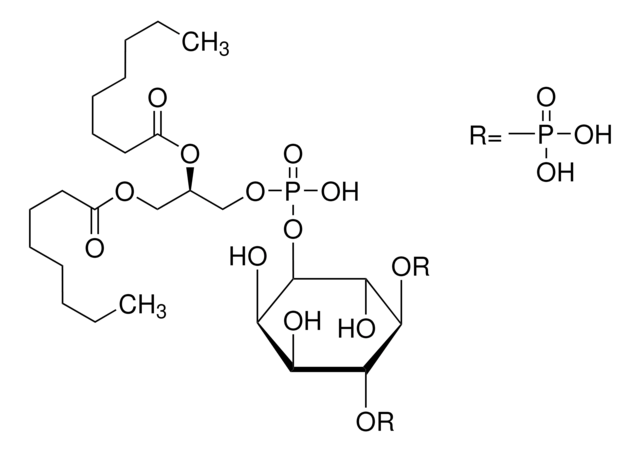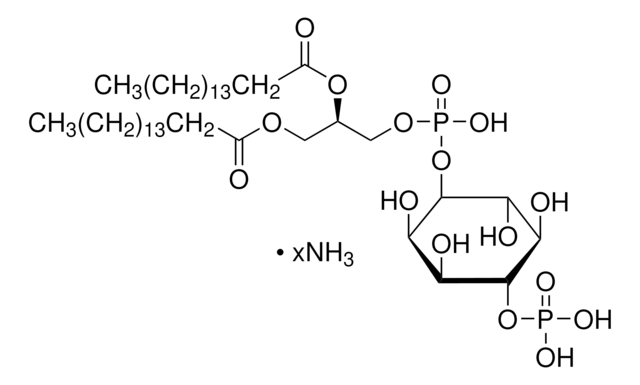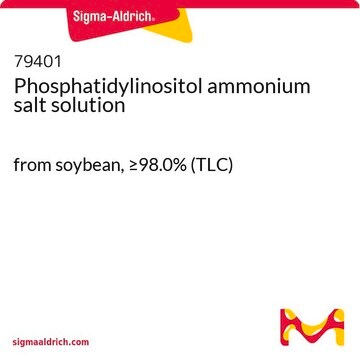Alle Fotos(1)
Wichtige Dokumente
P9638
L-α-Phosphatidylinositol 4-Monophosphat Natriumsalz
≥98%
Synonym(e):
Diphosphoinosit Natriumsalz, PIP, PtdInsP
Anmeldenzur Ansicht organisationsspezifischer und vertraglich vereinbarter Preise
Alle Fotos(1)
About This Item
UNSPSC-Code:
12352207
Empfohlene Produkte
Assay
≥98%
Form
powder
Löslichkeit
H2O: soluble
Versandbedingung
dry ice
Lagertemp.
−20°C
Suchen Sie nach ähnlichen Produkten? Aufrufen Leitfaden zum Produktvergleich
Biochem./physiol. Wirkung
Phosphorylated phospholipid membrane component, precursor of inositol phosphates. Formed in brain membranes from phosphatidylinositol by phosphatidylinositol 4-kinase.
Leistungsmerkmale und Vorteile
This compound is featured on the Phosphoinositide Kinases page of the Handbook of Receptor Classification and Signal Transduction. To browse other handbook pages, click here.
Lagerklassenschlüssel
11 - Combustible Solids
WGK
WGK 3
Flammpunkt (°F)
Not applicable
Flammpunkt (°C)
Not applicable
Persönliche Schutzausrüstung
Eyeshields, Gloves, type N95 (US)
Hier finden Sie alle aktuellen Versionen:
Besitzen Sie dieses Produkt bereits?
In der Dokumentenbibliothek finden Sie die Dokumentation zu den Produkten, die Sie kürzlich erworben haben.
C A O'Brian et al.
FEBS letters, 214(2), 339-342 (1987-04-20)
Protein kinase C(PKC) is a Ca2+- and phospholipid-dependent protein kinase which can be activated by diacylglycerol, a product of polyphosphoinositide hydrolysis. In this report, we show that the polyphosphoinositides L-alpha-phosphatidylinositol 4-monophosphate (PI 4P) and L-alpha-phosphatidylinositol 4,5-diphosphate (PI 4.5DP) can serve
L Raptis et al.
Journal of virology, 63(2), 753-758 (1989-02-01)
Polyomavirus middle tumor antigen (mT) was expressed in a line of mouse NIH 3T3 cells under control of the dexamethasone-regulatable mouse mammary tumor virus promotor. Contrary to rat F111 cells which were rendered anchorage independent by mT expression alone (L.
Siavash Fazel Darbandi et al.
Cell reports, 31(2), 107495-107495 (2020-04-16)
Tbr1 is a high-confidence autism spectrum disorder (ASD) gene encoding a transcription factor with distinct pre- and postnatal functions. Postnatally, Tbr1 conditional knockout (CKO) mutants and constitutive heterozygotes have immature dendritic spines and reduced synaptic density. Tbr1 regulates expression of
Unser Team von Wissenschaftlern verfügt über Erfahrung in allen Forschungsbereichen einschließlich Life Science, Materialwissenschaften, chemischer Synthese, Chromatographie, Analytik und vielen mehr..
Setzen Sie sich mit dem technischen Dienst in Verbindung.








